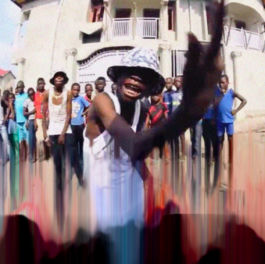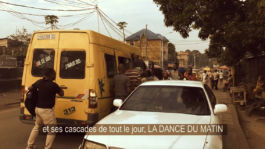



Tuesday, May 10, 2022, 8 pm, AcudMachtNeu, Berlin, free admission
Screening and Talk, curated by Cornelia Lund (fluctuating images, Berlin/University of the Arts Bremen) and Holger Lund (fluctuating images, Berlin/DHBW Ravensburg) in collaboration with Peter Miyalu (Académie des Beaux Arts, Kinshasa). With films by ANDER Concept, Peter Miyalu, Nizar Saleh and Moimi Wezam.
Credits film stills/film poster:
Céline Banza, Tere Mbi
Moizi Wezam, Zero
Lunatic Beudo, GangstaF*ckinBitch, still re-worked by Paul Brenner
Peter Miyalu, La Dance Du Matin
Labkontempo Kinzonzi: Choreographies of the Everyday
There are different ways to describe the workings of a Megalopolis and the chosen metaphors highlight different aspects of city life, from the urban battleground to the more (an)organic association of the concrete jungle, or the altogether fruity Big Apple. Whatever attitude is taken towards the metropolis, one feature will always be the specific choreography that emerges from it. A choreography involving all kinds of fluxes and movements of people, objects, data, and ideas, produced by a constant process of negotiation on all levels of daily life.
The very conditions of Kinshasa as a rather young structure founded under colonial rule and based on colonial ideas are still defining moments of its choreographic threads, never completely overwritten, supplemented by newer developments. The interweaving of the city’s daily dances can be described as a creative process that produces the intricate tissue of life at Kinshasa.
This screening presents some of these choreographies of the everyday in a choice of music videos and documentary films. The process of negotiating movement in and through the city as well as the access to and disposal of material are recurring themes in them. And so is the negotiation of participation in and access to different strata of this choreographic tissue that is the life in Kinshasa. One strong focus of the programme is the aspect of gender, with Céline Banza singing about the female body, the dancers in Ofele transgressing normative cis-gender definitions of the body, and Bénédicte in Zero braving all obstacles to become a singer in her own right.
Behind the screening lies another form of choreographic negotiation: the collaboration between Peter Miyalu, a young filmmaker from Kinshasa, and fluctuating images from Berlin. Without Peter’s insight into the inner workings of the creative Kinshasa choreographies, this programme would simply not have been possible.
Films:
La danse du matin, Director: Peter Miyalu, 2019, 2 min
Bidon Vil, Director: Nizar Saleh, 2018, 4 min
Ofele, Director: Nizar Saleh, Music: Pierre Kwenders & Uproot Andy, 2021, 3 min
Te rembi, Director: Nizar Saleh, Music: Céline Banza, 2019, 3:40 min
GangstaF*cknB*tch (Bana Mabe), Director: ANDER Concept, Music: Lunatic Beudo, 2015, 4 min
Zero, Director: Moimi Wezam, 2018, 66 min
Synopsis Zero:
Papa Wemba, the African pop icon who was both the idol and employer of Bénédicte Shutsha, has died.
In a room lit by candlelight, Bénédicte religiously listens to the hit ZERO composed and performed by the late Papa Wemba. Her eyes are moistened with tears. Her thoughts go back to her 15 years as a dancer in the group of the late great Papa Wemba: the group VIVA LA MUSICA. A few minutes later, her thoughts turn to her fears for the future and specifically to her calamitous financial situation.
The next day, Bénédicte goes to a television set where she speaks about her experience with the man the journalist called “LE MAITRE D’ECOLES” and whom she affectionately called “PAPA.” She takes advantage of this appearance to announce her project to cover the hit ZERO.
For the completion of her perilous project whose objective is both to pay tribute to her former employer and to launch her singing career, Bénédicte is accompanied by Moli (a renowned vocal coach) and Tosha (conductor of VIVA LA MUSICA).
More information:
https://acudmachtneu.de/events/1835/labkontempo-choreographies-of-the-everyday/
German and French texts below
Choreographies of the Everyday
Es gibt verschiedene Möglichkeiten, eine Megalopolis zu beschreiben; meist heben die gewählten Metaphern unterschiedliche Aspekte des Stadtlebens hervor, von der urbanen Kampfzone bis hin zur eher (an)organischen Assoziation des Betondschungels oder des ganz und gar fruchtigen Big Apple. Unabhängig von der bevorzugten Sichtweise auf die Metropole, wird ein Merkmal der Urbanität immer die spezifische Choreografie sein, welche die Stadt hervorbringt. Eine Choreografie, die alle Arten von Strömen und Bewegungen von Menschen, Objekten, Daten und Ideen umfasst und durch einen ständigen Prozess der Aushandlung auf allen Ebenen des täglichen Lebens entsteht.
Die Struktur von Kinshasa als einer recht jungen Stadt, die unter der Kolonialherrschaft gegründet wurde und auf kolonialem Gedankengut basiert, ist immer noch ein bestimmendes Moment ihrer choreografischen Fäden, das nie vollständig überschrieben, jedoch durch neuere Entwicklungen ergänzt wird. Die Verflechtung der täglichen Tänze der Stadt kann als kreativer Prozess beschrieben werden, der das komplizierte Gewebe des Lebens in Kinshasa hervorbringt.
Das Screening zeigt einige dieser Choreographies of the Everyday in einer Auswahl von Musikvideos und Dokumentarfilmen. Der Prozess der Aushandlung von Bewegung in und durch die Stadt sowie der Zugang zu und die Entsorgung von Material sind wiederkehrende Themen in ihnen. Ebenso wie die Verhandlung der Teilnahme an und des Zugangs zu verschiedenen Schichten dieses choreografischen Gewebes, aus dem das Leben in Kinshasa sich konstituiert. Desweiteren bildet Gender einen Fokus des Programms, mit Céline Banza, die den weiblichen Körper thematisiert, den Tänzer*innen in Ofele, die normative cis-geschlechtliche Definitionen des Körpers überschreiten, und Bénédicte in Zero, die allen Hindernissen trotzt, eine eigenständige Karriere als Sängerin anstrebt.
Hinter dem Screening-Programm verbirgt sich eine weitere Schicht der choreografischen Aushandlung: die Zusammenarbeit zwischen Peter Miyalu, einem jungen Filmemacher aus Kinshasa, und fluctuating images aus Berlin. Ohne Miyalus Kenntnisse und Einblicke in das Innenleben der kreativen Choreografien Kinshasas wäre dieses Programm nicht möglich gewesen.
Kuratiert von Cornelia Lund (fluctuating images, Berlin/HfK Bremen) und Holger Lund (fluctuating images, Berlin/DHBW Ravensburg) in Zusammenarbeit mit Peter Miyalu (Académie des Beaux Arts, Kinshasa).
Films:
La danse du matin, Regie: Peter Miyalu, 2019, 2 min
Bidon Vil, Regie: Nizar Saleh, 2018, 4 min
Ofele, Regie: Nizar Saleh, Musik: Pierre Kwenders & Uproot Andy, 2021, 3 min
Te rembi, Regie: Nizar Saleh, MusiK: Céline Banza, 2019, 3:40 min
GangstaF*cknB*tch (Bana Mabe), Regie: ANDER Concept, Musik: Lunatic Beudo, 2015, 4 min
Zero, Regie: Moimi Wezam, 2018, 66 min
Zero: Synopsis
Papa Wemba, Ikone der afrikanischen Popmusik, zugleich Idol wie auch der Arbeitgeber von Bénédicte Shutsha, ist tot.
In einem von Kerzenlicht erhellten Raum hört sich Bénédicte den Hit ZERO an, den der verstorbene Papa Wemba komponiert und interpretiert hat. Ihre Augen sind tränenfeucht. Ihre Gedanken wandern zu den 15 Jahren, die sie als Tänzerin in der Gruppe VIVA LA MUSICA des berühmten Verstorbenen verbracht hat. Wenige Minuten später konzentrieren sich ihre Gedanken auf ihre Zukunftsängste, insbesondere auf ihre fatale finanzielle Situation.
Am nächsten Tag besucht Bénédicte eine Fernsehsendung, in der sie über ihre Erfahrungen an der Seite des Mannes spricht, den der Journalist „LE MAITRE D'ECOLES“ nennt und den sie liebevoll „PAPA“ nennt. Sie nutzt diesen Auftritt, um ihr Vorhaben anzukündigen, als Sängerin ihre Version des Hits ZERO herauszubringen.
Für die Umsetzung dieses riskanten Projekts, mit dem sie sowohl ihren ehemaligen Arbeitgeber ehren als auch ihre Gesangskarriere starten will, lässt sich Bénédicte von Moli, einem renommierter Vocalcoach, und Tosha, dem Dirigenten von VIVA LA MUSICA, begleiten.
Choreographies of the Everyday / Chorégraphies quotidiennes
Il y a plusieurs façons de décrire le fonctionnement d’une mégalopole et les métaphores choisies mettent en évidence différents aspects de la vie urbaine, du champ de bataille urbain à l’association plus (an)organique de la jungle de béton, ou à la Big Apple tout à fait fruitée. Quelle que soit le regard que l’on a sur la métropole, une caractéristique sera toujours la chorégraphie spécifique qu’elle fait naître. Une chorégraphie qui implique toutes sortes de flux et de mouvements de personnes, d’objets, de données et d’idées, produits par un processus constant de négociation à tous les niveaux de la vie quotidienne.
Les conditions mêmes de la ville de Kinshasa en tant que structure plutôt jeune, fondée sous le régime colonial et basée sur des idées coloniales, sont toujours des moments déterminants de ses fils chorégraphiques, jamais complètement écrasés, mais complétés par des développements plus récents. L’entrelacement des danses quotidiennes de la ville peut être décrit comme un processus créatif qui produit le tissu complexe de la vie à Kinshasa.
Ce programme présente certaines de ces chorégraphies quotidiennes kinoises dans un choix de clips musicaux et de films documentaires. Le processus de négociation du mouvement dans et à travers la ville ainsi que l’accès à et la traitement du matériel sont des thèmes récurrents. Tout comme la négociation de la participation et de l’accès aux différentes strates de ce tissu chorégraphique qu’est la vie à Kinshasa. En outre, le programme se focalise sue l’aspect du genre, avec Céline Banza qui chante le corps féminin, les danseur·euse·s d’Ofele qui transgressent les définitions normatives cis-genres du corps, et Bénédicte dans Zero qui brave tous les obstacles pour lancer sa arrière de chanteuse.
Derrière la projection se cache une autre forme de négociation chorégraphique : la collaboration entre Peter Miyalu, un jeune cinéaste de Kinshasa, et fluctuating images de Berlin. Sans le regard de Peter sur les rouages internes des chorégraphies créatives de Kinshasa, ce programme n’aurait tout simplement pas été possible.
Curaté par Cornelia Lund (fluctuating images, Berlin/Université des Arts de Brême) et Holger Lund (fluctuating images, Berlin/DHBW Ravensburg) en collaboration avec Peter Miyalu (Académie des Beaux Arts, Kinshasa).
Films:
La danse du matin, Réalisation: Peter Miyalu, 2019, 2 min
Bidon Vil, Réalisation: Nizar Saleh, 2018, 4 min
Ofele, Réalisation: Nizar Saleh, Musique: Pierre Kwenders & Uproot Andy, 2021, 3 min
Te rembi, Réalisation: Nizar Saleh, Musique: Céline Banza, 2019, 3:40 min
GangstaF*cknB*tch (Bana Mabe), Réalisation: ANDER Concept, Musique: Lunatic Beudo, 2015, 4 min
Zero, Réalisation: Moimi Wezam, 2018, 66 min
Synopsis de Zero:
Papa Wemba, cette icône de la pop-musique africaine qui était à la fois l’idole et l’employeur de Bénédicte Shutsha, est mort.
Dans une pièce éclairée à la lueur des bougies, Bénédicte écoute religieusement le tube ZERO composé et interprété par feu Papa Wemba. Ses yeux s’humectent de larmes. Ses pensées, elles, s’en vont vers ses 15 années passées en tant que danseuse au sein du groupe de l’illustre disparu : le groupe VIVA LA MUSICA. Quelques minutes après, ses pensées se focalisent sur ses craintes d’avenir et spécifiquement sur sa calamiteuse situation financière.
Le lendemain, Bénédicte se rend sur un plateau de télévision où elle parle de son expérience aux côtés de celui que le journaliste appelle « LE MAITRE D’ECOLES » et qu’elle appelle affectueusement « PAPA ». Elle profite de ce passage pour annoncer son projet de reprendre le tube ZERO.
Pour l’aboutissement de son périlleux projet, dont l’objectif est à la fois de rendre hommage à son ancien employeur et de lancer sa carrière de chanteuse, Bénédicte se fait accompagner de Moli (coach vocal de renom) et de Tosha (chef d’orchestre de VIVA LA MUSICA).